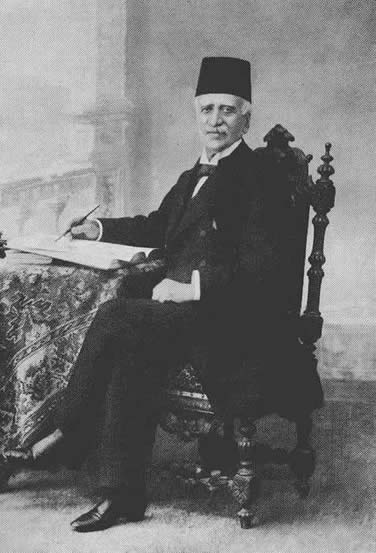
Prince Mirza Malkam Khan, Nazem al-Molk, Nazem-ed-Dowleh

Malkam Khan (a.k.a. Malkom, Malkum), (1833-1908), was the first commoner to receive the title "Prince" from an Iranian monarch. Nasser-ed-Din Shah bestowed the title upon him for his services to the crown. Nasser-ed-Din Shah was later greatly disappointed with what he considered a personal betrayal by Malkam Khan, when the latter turned against the Shah and engaged in bitter polemic against monarchical rule in Persia. Though royal favor was restored to Malkam Khan by Nasser-ed-Din Shah's son and successor, Mozaffar-ed-Din Shah in 1898, Malkam Khan, intentionally or untentionally, must be considered -- together with Jamal-ed-Din al-Afghani, as one of the instigators of violent feelings against Nasser-ed-Din Shah amongst extremists of the time, resulting in the assassination of the Shah by an agent of Afghani, Mirza Reza Kermani, in 1896.
---------
Below is an essay by our cousin, Dr. Mansoureh Ettehadieh (Nezam-Mafi), on Malkam Khan:
Mirza Malkam Khan: Persian diplomat, political philosopher, and advocate of modernization.
The son of Mirza Ya'qub, an Armenian from Jolfa who had converted to Islam, Mirza Malkom (also Malkam, Malkum) Khan studied in Paris, where he became familiar with French social and political theories, especially those of Auguste Comte. On his return to Persia, he was employed as a translator for the European teachers of the Dar al-Fonun, the modern school of higher learning inaugurated in 1851 by Persia's modernizing premier, Amir Kabir.
In 1857, Malkom wrote the first of his many pamphlets, entitled Ketabcheh-ye Ghaybi (The invisible booklet), in which he discussed the urgent need for modern reforms for Persia, if it were to survive as an independent nation. He also organized the Faramush-Khaneh (House of oblivion), a pseudo-masonic (secret) organization, which incurred the suspicion of the Naser al-Din Shah. Malkom was exiled in 1861 and went to Baghdad. There he was befriended by Mirza Hoseyn Khan, the Persian ambassador to the Ottoman Empire, who agreed with him about modernization and reforms and who obtained his pardon from the shah. Malkom was then made a counselor in the Persian embassy in Istanbul in 1864, during the early modernization period of Ottoman Turkey, called the Tanzimat. In 1871, Mirza Hoseyn was recalled to Tehran and appointed minister of justice, then prime minister. Malkom was appointed minister to Britain.
From London, Malkom continually addressed the shah and his ministers about the need for modernization reforms. His arguments were not always original, but they were simply argued, easily understood, and effective - he criticized the government, but spared the shah. Some of his suggestions were attempted, but the experiment did not last, since the shah grew tired of the complications of change and the ongoing rivalry at court. He lost interest in all this and became more tyrannical toward the end of his reign.
While Malkom was in London, the shah took three trips to Europe, visiting London each time, where several important concessions were granted to European and British companies. Malkom was involved in their transactions and had the opportunity to benefit financially each time. In 1889, the shah granted a lottery concession to an English company, which came under attack when he returned to Persia, and the concession was canceled. Malkom, however, who knew this, did not reveal the cancellation until he had sold out his own shares.
This unethical situation cost him his position, his title, and his salary. In 1890, he began to publish a pamphlet entitled Qanun (The law) in London. In it his arguments turned to criticism, then outright attack, not even sparing the shah. He also mentioned secret societies that were working for reform and suggested that the natural leaders of the people were by right the ulama (body of mollas), and that they should lead the movement. It has since been suggested that these secret societies were not actually organized but that Malkom was saying they should be. Qanun was smuggled into the country and enjoyed a widespread popularity, making its mark on a generation that was soon to become involved in the Constitutional Revolution.
After the assassination of Naser al-Din Shah in 1896, Malkom was restored to favor and was appointed minister to Italy. He lived to see the beginning of the Constitutional Revolution in 1906. Despite a lifetime of argument in favor of reform, his role in the lottery concession continues to sully his name. Notwithstanding such criticism, his influence on the shah, the politicians of his day, and the modernization of Persia cannot be denied.
Bibliography
Algar, Hamid. Mirza Malkum Khan: A Study in the History of Iranian Modernism. Berkeley: University of California Press, 1973.
Bakhash, Shaul. Iran: Monarchy, Bureaucracy, and Reform under the Qajars, 1858 - 1896. London: Ithaca Press, 1978.
— MANSOUREH ETTEHADIEH